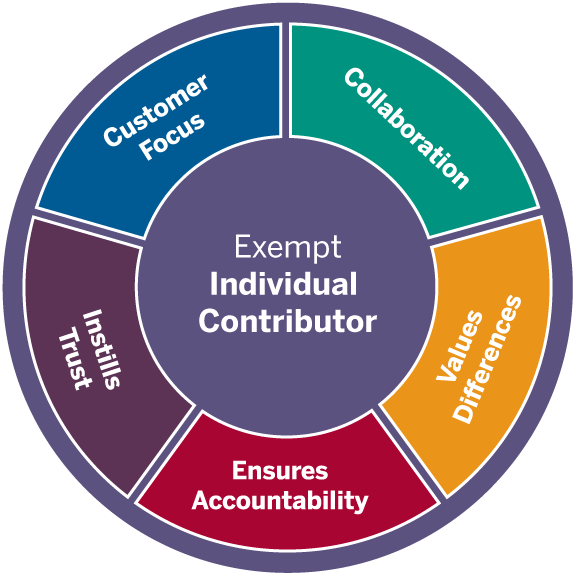Exempt Individual Contributor: Advanced
Situational Adaptability
Adapting approach and demeanor in real time to match the shifting demands of different situations
Those skilled at situational adaptability recognize the need to be flexible and act differently because no two situations are exactly alike. They know that using the same approach, tone, and style in different settings may be consistent, but not necessarily effective. Quickly adjusting and fine-tuning your behavior in real time allows you to be versatile in different situations and interactions with others. Continuously gauge the impact you’re having and stay alert to make adjustments to your demeanor and approach. Be flexible to meet the needs of the moment.
You show this competency when you:
- Pick up on situational cues and adjusts in the moment
- Readily adapt personal, interpersonal, and leadership behavior
- Understand that different situations may call for different approaches
- Can act differently depending on the circumstances
How to develop this competency:
Tune in
Everyone is different. To really understand what’s going on with people in a given situation, you need to tune in to what’s going on beneath the surface. Pay close attention to what people say or do first. What do they emphasize in their behavior or speech? People focus on different things: taking action, details, concepts, feelings, or other people. Listen for values: things that ignite passion and emotion. Adapt your style and behavior by responding in a way that eases the transaction and promotes a productive outcome.
Think about the consequences
Use mental rehearsal to think about different ways you could engage. Picture the response. Try to see yourself acting in opposing ways to get to the same outcome: being tough, letting others decide, or deflecting the issue. What cues would you look for to select an approach that matches what you want to accomplish? Now, focus on the situation at hand and the player involved: which approach will likely yield the best outcome?
Manage the first three minutes
Managing the first three minutes of any situation is essential. The tone is set. First impressions are formed. Work on being open and approachable. This means putting others at ease. It means initiating rapport, listening, sharing, understanding, and comforting. Approachable people get more information, know things earlier, and can get others to do more things. The more you can get others to speak up early in the process, the more you will know about where they’re coming from and the better you can tailor your approach.
Learn more:
- Book: Ensuring Adaptability and Delivering Results: Focusing on Drive, Delivery and Performance by LID Editorial (IU Skillport book)
- Video: TED: The Strength of Adaptability: Achieving the Impossible
- Article: Adaptability: The Surprisingly Strong Predictor of Career Success
- Article: Forbes: Why Adaptability is Key to Your Business’ Success
- LinkedIn Learning: Situational Adaptability course collection

Exempt Individual Contributor
Page updated: May 2023
IU Human Resources
Contact Us
